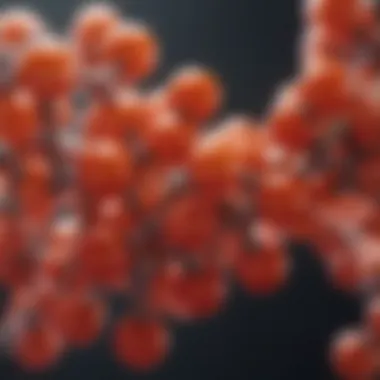Understanding Quercetin Complex: Health Benefits


Well-Being Overview
Understanding the concept of well-being is essential for anyone interested in improving overall health. Well-being is not simply the absence of disease; it encompasses mental, emotional, and physical states. Focusing on well-being can lead to a more fulfilling life. Its comprehensive approach helps individuals manage stress and develop resilience against various challenges they face.
Importance of Focusing on This Aspect of Well-Being
The significance of well-being in our lives cannot be overstated. Research indicates that individuals who prioritize their well-being are more likely to experience positive health outcomes, including improved quality of life and longevity. Among various strategies to enhance well-being, nutrition plays a pivotal role.
Quercetin Complex: A Closer Examination
Quercetin complex stands out as a powerful flavonoid. It is significant due to its anti-inflammatory and antioxidant properties. Understanding how it functions in the body can lead to better health management strategies.
Benefits for Inflammation
Quercetin complex has the potential to reduce inflammation. Inflammation is often linked to chronic diseases. Integrating quercetin into the diet could lead to better control over these conditions.
Quercetin acts as an anti-inflammatory agent, which may help mitigate symptoms related to various inflammatory diseases.
Immune System Support
A strong immune system is vital for health. Quercetin complex may enhance immune functions. Research suggests that it can help combat oxidative stress, which can suppress immune response. Including foods rich in quercetin like onions and apples in diets can bolster immunity.
Cardiovascular Health
The benefits of quercetin extend to heart health as well. Studies suggest it may help reduce blood pressure and improve blood flow. These effects can significantly contribute to cardiovascular wellness, making it an important inclusion in diets aimed at promoting heart health.
Nutrition for Nourishment
Benefits of a Balanced Diet
A balanced diet serves as the foundation of both mental and physical health. It can provide the necessary nutrients for maintaining energy levels and psychological stability.
Nutrient-Rich Food Recommendations
To incorporate quercetin, consider:
- Onions: Raw onions provide one of the highest concentrations of quercetin.
- Apples: They offer not only quercetin but also essential fibers.
- Berries: Various berries contain quercetin, promoting digestive health.
Easy and Healthy Recipes to Try
Incorporating quercetin-rich foods into meals can be simple. For instance, a fresh salad with sliced onions and mixed greens topped with a berry vinaigrette can boost your intake.
Mindfulness & Self-Care Practices
Exploring Mindfulness Techniques
Practicing mindfulness can enhance the benefits of quercetin. Being aware of your mental states and responses can optimize how effectively the body utilizes these nutrients.
Self-Care Rituals for Rejuvenation


Engaging in self-care routines boosts well-being. Consider simple practices like taking short walks outside or enjoying quiet reading time to recharge.
Balancing Work and Relaxation
Finally, achieving a balance between professional activities and personal downtime is crucial. This balance helps maintain overall wellness and facilitates better health outcomes, optimizing the benefits of quercetin complex.
Prelims to Quercetin Complex
Quercetin complex represents an intriguing area of study within nutritional and biomedical research. This simple flavonoid has potential implications on various aspects of health. Understanding quercetin complex is significant for health professionals, wellness coaches, and nutritionists as its application spans from allergy management to potential cardiovascular benefits. The growing body of evidence suggests that quercetin complex may play a crucial role in holistic approaches to health and wellness.
Definition and composition
Quercetin is a plant pigment belonging to the flavonoid family. It commonly occurs in many fruits, vegetables, and grains. Chemically, it is classified as a polyphenol made up of three rings: two benzene rings and a heterocyclic ring. This structure is crucial for its biological activity. The quercetin complex refers not only to quercetin itself but also to its synergistic compounds that enhance its bioactivity. These components may include other flavonoids or antioxidants, creating a more powerful combination than quercetin alone.
Sources of quercetin
Various food sources contain substantial amounts of quercetin. It is predominantly found in:
- Onions: Especially the red varieties, are one of the richest sources.
- Apples: The skin of apples is particularly high in quercetin content.
- Berries: Such as cranberries and blueberries, also contribute to dietary intake.
- Tea: Green and black tea provide notable amounts of this flavonoid.
- Red wine: Contains quercetin from grapes, particularly in less processed varieties.
By incorporating these foods into daily diets, individuals may increase their intake of quercetin. This can pave the way for realizing its health benefits, thus making awareness of these sources essential for anyone focused on improving well-being.
Health Benefits of Quercetin Complex
Quercetin complex is known for its potential health benefits that range from promoting a stronger immune system to protecting against chronic diseases. Understanding these benefits is crucial for health professionals, wellness coaches, and anyone interested in enhancing their well-being. This section will explore the various health benefits associated with quercetin complex, detailing its antioxidant properties, anti-inflammatory effects, immune support, cardiovascular health, and potential anticancer capabilities.
Antioxidant properties
Quercetin exhibits strong antioxidant activity. Antioxidants are compounds that help neutralize free radicals, which can cause oxidative stress and lead to cellular damage. By reducing oxidative stress, quercetin may contribute to improved overall health. Its ability to scavenge free radicals can protect cells from damage that can lead to various diseases. Incorporating quercetin-rich foods such as onions, apples, and berries into the diet is a practical way to harness these antioxidant benefits.
Anti-inflammatory effects
Another significant benefit of quercetin is its anti-inflammatory effects. Chronic inflammation is often linked to many health issues, including heart disease, diabetes, and arthritis. Quercetin has been shown to inhibit inflammatory pathways, which can help reduce inflammation throughout the body. This property makes it potentially beneficial for individuals suffering from inflammatory conditions. Regular consumption of quercetin may help manage symptoms and promote a state of balance within the body.
Enhancing immune function
Quercetin has also been identified as an immune system booster. It supports the body’s defenses by modulating immune responses. Studies suggest that quercetin may enhance the production of immune cells and cytokines that play a role in fighting infections. This immune-enhancing property could provide individuals with stronger protection against common illnesses, especially during cold and flu seasons. Adding quercetin supplements or foods to a wellness regimen may be advantageous for those seeking to improve their immune health.
Support for cardiovascular health
Quercetin has been linked to cardiovascular health. It may support heart function and overall vascular health by reducing blood pressure and improving circulation. Research shows that quercetin can help lower levels of bad cholesterol, which can contribute to heart disease. Additionally, its ability to improve endothelial function plays a critical role in heart disease prevention. For individuals focused on heart health, including quercetin-rich items in their diets could be beneficial.
Potential anticancer properties
The role of quercetin in cancer prevention has sparked interest in the health community. Some studies indicate that quercetin may have anticancer properties by inhibiting the growth of cancer cells and enhancing apoptosis, which is the programmed cell death that removes damaged or abnormal cells. While more research is needed, quercetin shows promise as a complementary approach to traditional cancer therapies. Including quercetin in dietary practices might serve as a protective factor against certain types of cancers.
"Quercetin's potential to reduce inflammation and oxidative stress may be instrumental in preventing chronic diseases."
In summary, the health benefits of quercetin complex are substantial. Its properties as an antioxidant, anti-inflammatory, immune enhancer, cardiovascular supporter, and potential anticancer agent make it an important compound in health and wellness discussions. Understanding these benefits allows health professionals and wellness practitioners to better advise their clients on effective strategies for incorporating quercetin into their lifestyles.
Mechanisms of Action


Understanding how quercetin complex functions within the body provides insights into its potential health benefits. Mechanisms of action refer to the specific biochemical interactions through which quercetin exerts its effects. By elucidating these processes, we can gain a clearer understanding of how to utilize quercetin effectively in health and wellness applications.
Impact on cellular signaling pathways
Quercetin influences various cellular signaling pathways, which are crucial for regulating a range of physiological processes. For instance, quercetin has been observed to modulate the activity of protein kinases and transcription factors. These alterations can lead to changes in cellular behavior such as apoptosis, proliferation, and metabolism. The mitogen-activated protein kinase (MAPK) cascade is one pathway significantly influenced by quercetin. By impacting this pathway, quercetin can reduce oxidative stress and inflammation, thus promoting a healthier cellular environment.
Quercetin's ability to fine-tune cellular signaling pathways may be pivotal in its potential as a therapeutic agent against chronic diseases.
Moreover, quercetin enhances the activation of Nuclear Factor Erythroid 2–Related Factor 2 (Nrf2), a key regulator of antioxidant responses. This activation leads to increased production of antioxidant enzymes, further contributing to the protection against cellular damage from free radicals.
Role in gene expression modulation
Gene expression modulation is another important mechanism of quercetin's action. Quercetin can interact with DNA and impact the transcription of genes associated with inflammation, immune response, and cellular stress. By altering the expression of specific genes, quercetin can facilitate a healthy balance in bodily functions.
For instance, quercetin has been shown to down-regulate pro-inflammatory cytokines like Tumor Necrosis Factor-alpha (TNF-α) and Interleukin-6 (IL-6). This interaction supports its anti-inflammatory properties, making it beneficial for individuals suffering from chronic inflammatory conditions. Additionally, up-regulating antioxidant genes helps to combat oxidative stress, reinforcing cellular protection mechanisms.
Effects on inflammation mediators
Quercetin acts on various mediators of inflammation, which are significant in the context of chronic diseases. One key aspect of quercetin’s role is its ability to inhibit the production of inflammatory mediators, such as nitric oxide and prostaglandins. By obstructing the signaling pathways that lead to their production, quercetin can help mitigate excessive inflammatory responses.
Furthermore, quercetin can suppress the activity of Nuclear Factor-kappa B (NF-kB), a major player in the regulation of inflammation. By inhibiting this transcription factor, quercetin not only reduces inflammation but also supports a more balanced immune response.
To summarize, the mechanisms of action for quercetin complex highlight its profound effects on health. Through modulation of cellular signaling pathways, gene expression, and inflammation mediators, quercetin presents a multifaceted approach to enhancing health outcomes. This knowledge is crucial for health professionals, wellness coaches, and others working in the fields of nutrition and fitness.
Quercetin's Role in Wellness Regimens
Quercetin's role in wellness regimens is significant, as it provides numerous advantages that can enhance overall health. Highlighting this topic emphasizes how incorporating quercetin can support various bodily functions. From improving immune responses to mitigating oxidative stress, quercetin serves as a versatile compound in maintaining well-being.
Integration into dietary plans
Integrating quercetin into dietary plans is relatively straightforward. Foods rich in quercetin include onions, apples, berries, and green tea. Including these foods in daily meals can yield substantial health benefits. For example, adding onion to salads or including berry smoothies contributes to a higher intake of quercetin. Besides, cooking methods can also affect the quercetin levels, as some techniques preserve its integrity better than others. Thus, understanding how to combine foods in a way that maximizes quercetin intake will benefit wellness.
Supplementation considerations
When considering quercetin supplementation, several factors must be evaluated. If diet alone cannot provide sufficient quercetin, supplements might be an option. It is essential to check the quality of supplements, verifying they come from reputable brands. There are various forms available, such as capsules, powders, and liquid extracts. Each form may have different absorption rates, making it vital to choose based on individual needs. Consulting with a healthcare provider is also advisable to address personal health conditions or any potential interactions with medications.
Timing and dosage recommendations
Timing and dosage of quercetin can influence its effectiveness. Experts often suggest a dosage range between 500 mg to 1000 mg per day. However, personal tolerance and specific health goals should guide this decision. Taking quercetin with meals may enhance absorption due to the presence of fats and other nutrients. Moreover, timing the intake around exercise could maximize its antioxidant effects, aiding in recovery and performance.
"Understanding quercetin's placement within wellness regimens can lead to better health outcomes."
In sum, understanding how to effectively integrate quercetin within dietary habits, considering supplementation options, and adapting timing and dosage contribute to its role in wellness. This approach can help optimize health benefits and support individuals in achieving their health goals.
Quercetin Complex and Specific Health Conditions
Quercetin complex has shown potential in addressing various specific health conditions, making it a significant topic of interest in both medical research and wellness practices. Understanding how it interacts with certain health issues can provide valuable insights for health professionals, wellness coaches, and others in the health field. This section will delve into the advantages quercetin complex offers for allergies, metabolic syndrome, and cognitive health.
Allergies and respiratory health


Quercetin has gained attention for its effectiveness in managing allergies and improving respiratory health. It acts as a natural antihistamine, which can help reduce symptoms associated with allergic reactions. In conditions like hay fever or allergic rhinitis, quercetin may minimize inflammation and mucus production. This makes it a useful supplement for individuals affected by seasonal allergies or respiratory disorders.
Research suggests that quercetin can inhibit the release of histamines from mast cells, which play a major role in allergic responses. When taken consistently, quercetin might contribute to better airway function and decreased nasal congestion. Additionally, its antioxidant properties can help mitigate oxidative stress within the respiratory tract.
Metabolic syndrome and quercetin
Metabolic syndrome comprises a range of conditions, including obesity, insulin resistance, high blood pressure, and dyslipidemia. Quercetin has been studied for its potential role in alleviating some of these health issues. The flavonoid's anti-inflammatory and antioxidant effects might be beneficial in preventing the complications associated with metabolic syndrome.
Quercetin intake may support weight loss and improve lipid profiles, contributing to better overall metabolic health. By regulating the expression of genes involved in fat metabolism, it may assist in lowering LDL cholesterol levels and improving insulin sensitivity. In a practical approach, those at risk of metabolic syndrome could consider incorporating quercetin-rich foods or supplements into their dietary strategies.
Neuroprotection and cognitive health
Another promising area of research regarding quercetin complex is its neuroprotective capabilities. Cognitive decline and neurodegenerative diseases, such as Alzheimer's and Parkinson's, pose challenges for many individuals, particularly the aging population. Quercetin is thought to provide benefits through its antioxidant properties, which help protect brain cells from oxidative damage.
Moreover, some studies indicate that quercetin may enhance neuronal function and improve memory. It could affect signaling pathways related to neuronal health, which may lead to increased cognitive resilience. For health professionals working with older adults, recommending quercetin as part of a cognitive health regimen could be valuable, alongside other lifestyle changes like diet and exercise.
Quercetin complex holds great promise in the domain of specific health conditions, with further research needed to ascertain its full potential.
By understanding the specific health conditions impacted by quercetin complex, practitioners can better guide their patients and clients in utilizing this compound effectively for improved health outcomes.
Safety and Side Effects
The section on safety and side effects is a crucial element when exploring the benefits of quercetin complex. It is essential to recognize that while quercetin has numerous potential health advantages, understanding its safety profile is equally important for informed consumption. This ensures that individuals can harness its benefits while minimizing any risk of adverse effects.
Known interactions with medications
Quercetin can interact with certain medications, which is vital information for anyone considering its inclusion in their health regimen. Specifically, it has the potential to affect the metabolic pathway of various drugs processed in the liver.
- Blood thinners: Quercetin may enhance the effects of anticoagulant medications like warfarin or aspirin. This could increase the risk of bleeding, making it vital to monitor dosage carefully.
- Antibiotics: Some studies suggest that quercetin might inhibit specific cytochrome P450 enzymes. These enzymes are responsible for metabolizing many drugs, including certain antibiotics, possibly leading to altered effectiveness.
- Immunosuppressants: For individuals taking immunosuppressive drugs, quercetin could enhance immune functions, potentially counteracting the intended effects.
Before considering quercetin supplementation, it is critical to consult a healthcare professional, especially if you are on medications that may interact negatively.
Possible allergic reactions
Though generally regarded as safe for most, quercetin can cause allergic reactions in certain individuals. Allergies to quercetin are rare, but they do occur. It is important to be aware of these possibilities:
- Skin reactions: Individuals may experience rashes or hives upon exposure to quercetin.
- Digestive issues: Some people report gastrointestinal discomfort, such as nausea or diarrhea, after consuming quercetin.
- Respiratory symptoms: In rare cases, quercetin may induce allergic respiratory reactions, presenting as shortness of breath or wheezing.
If any of these symptoms arise after taking quercetin, it is advisable to discontinue use and consult with a healthcare professional. Maintaining awareness of one’s body and any changes after taking supplements is crucial for overall safety.
By understanding the safety and side effects, individuals can make more informed choices regarding quercetin complex and its role in their health.
Finale: The Future of Quercetin Complex Research
The exploration of quercetin complex holds significant promise for health and nutrition fields. Understanding its mechanisms and applications can lead to better health outcomes. The current research highlights its benefits but also emphasizes the need for further investigation. It is crucial to assess how quercetin can be effectively integrated into health regimens. This review of quercetin’s potential informs various sectors, particularly for health professionals and wellness coaches seeking evidence-based practice.
Emerging studies and future directions
Several emerging studies are investigating the therapeutic potential of quercetin. These studies focus on its effects on chronic diseases, addressing inflammation and oxidative stress. Ongoing clinical trials are essential to discern the optimal dosages and forms of quercetin supplementation. Additionally, research is exploring its interaction with other compounds, leading to enhanced efficacy. Potential future directions include:
- Investigating the synergy of quercetin with other flavonoids and polyphenols
- Conducting long-term studies to assess safety and effectiveness
- Exploring its role in specific populations, such as those with existing health conditions
Such research will be essential in translating laboratory findings into practical applications.
Final thoughts on quercetin complex
Quercetin complex represents an exciting area within nutritional science. The breadth of its health benefits indicates its potential as a valuable addition to wellness practices. While current evidence supports its use for inflammation and immunity, the future of quercetin research will shape our understanding of its broader implications. As health professionals consider the incorporation of natural compounds into patient care, quercetin complex merits serious consideration. Ultimately, building upon existing knowledge can enhance its utility and optimize health outcomes effectively.



